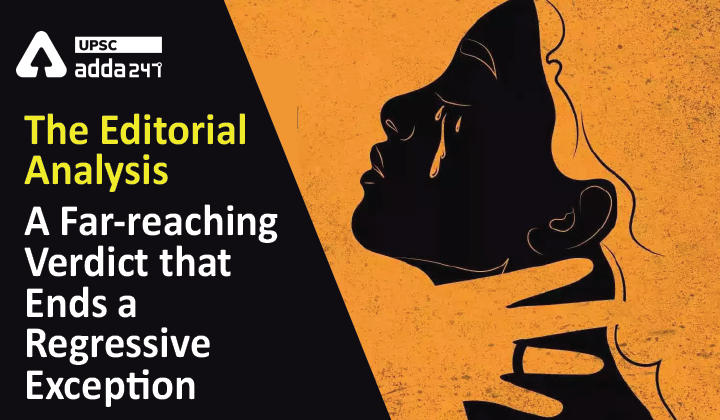Table of Contents
A Far-reaching Verdict that Ends a Regressive Exception- Relevance for UPSC Exam
- GS Paper 2: Governance, Administration and Challenges- Mechanisms, laws, institutions and Bodies constituted for the protection and betterment of vulnerable sections.
A Far-reaching Verdict that Ends a Regressive Exception
- Recently, the Karnataka High Court, in the case of Hrishikesh Sahoo vs the State of Karnataka, pronounced the end of the marital rape exception in Section 375 of the Indian Penal Code (IPC).
Background of the Marital Rape Case Judgement
- The Karnataka HC’s judgment was a result of a unique case where a woman had filed a criminal complaint of rape against her husband due to the repeated acts of sexual assault she had to face.
- The police registered her complaint under Section 376 notwithstanding the marital rape exception, a charge sheet was filed and the Sessions Judge took cognisance and framed charges under Section 376.
- The husband filed an application to drop the charge of Section 376 but the Sessions Judge rejected it.
- This led to the husband approaching the High Court seeking to quash the criminal proceedings.
The Editorial Analysis- Cohesion, Co-operation
Madras HC Judgement on Marital Rape
- In a nuanced and far-reaching judgment, Justice Nagaprasanna refused to quash the charge of rape against the husband.
- He held that if a man, being a husband is exempted for his acts of sexual assault, it would destroy women’s right to equality, which is the very soul of the Constitution.
- He held that the Constitution recognizes and grants equal status to women, but the exception to marital rape in the IPC amounts to discrimination because a wife is treated as subordinate to the husband.
- Constitutional Rights: The Constitution considers marriage as an association of equals and does not in any sense depict women to be subordinate to men.
- The Constitution guarantees women fundamental rights under Articles 14, 15, 19 and 21.
- These Articles provide women with the right to live with dignity, personal liberty, bodily integrity, sexual autonomy, right to reproductive choices, right to privacy, and right to freedom of speech and expression.
- He held that the exemption of the husband on committal of such assault/rape cannot be so absolute that it becomes a licence for the commission of a crime.
The Editorial Analysis: India’s Food Response as ‘Vasudhaiva Kutumbakam’
Earlier Judgements on Marital Rape
- In Independent Thought vs Union of India (2017), the Supreme Court of India diluted it and removed the exception to marital rape to a wife not below 15 years and made it 18 years.
- The Supreme Court held that a girl cannot be treated as a commodity having no say over her body or someone who has no right to deny sexual intercourse to her husband.
- SC also held that the human rights of a girl child are very much alive and kicking whether she is married or not.
Abolition of Exception of Marital Rape in the United Kingdom
- In the United Kingdom, in 1991, the exception to marital rape was done away within the case of R. vs R.
- The House of Lords held that where the common law rule no longer even remotely represents what is the true position of a wife in present-day society, the duty of the court is to take steps to alter the rule.
- The court held that a husband’s immunity no longer exists and took the view that the time had arrived when the law should declare that a rapist remains a rapist subject to the criminal law, irrespective of his relationship with his victim.
Conclusion
- In pronouncing the end of the marital rape exception, the Karnataka High Court has delivered a nuanced judgment.
Women Transforming India Awards (WTI)





 TSPSC Group 1 Question Paper 2024, Downl...
TSPSC Group 1 Question Paper 2024, Downl...
 TSPSC Group 1 Answer key 2024 Out, Downl...
TSPSC Group 1 Answer key 2024 Out, Downl...
 UPSC Prelims 2024 Question Paper, Downlo...
UPSC Prelims 2024 Question Paper, Downlo...




